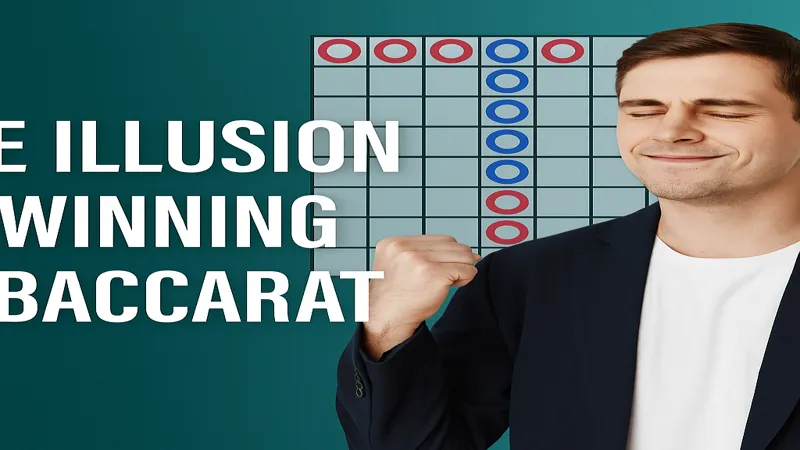
Introduction: When Confidence Turns Into a Trap
Baccarat is often seen as a game of chance with a slight edge toward the banker. But ask any experienced player, and you’ll find many claim they have a “system” or feel confident about predicting the next round. This phenomenon is known as the illusion of winning, or more specifically, the illusion of control—a cognitive bias where players overestimate their ability to predict outcomes in a mostly random game. Platforms like Dubai7 have made the game widely accessible, and understanding this illusion is crucial for anyone serious about playing smart.
Pattern Recognition Gone Too Far
Humans are wired to find patterns, even in randomness. In baccarat, this behavior manifests in players obsessively tracking streaks, roadmaps, and “trends” like Banker runs or alternating outcomes. These charts, common on Dubai7, are useful for organizing information, but they don’t actually predict future outcomes.
Psychological Trap:
Players believe that identifying a pattern gives them an edge, even though each round is independent and not influenced by past results.
Confirmation Bias: Seeing What You Want to See
When a player predicts “Banker” five times and hits three, they remember the three wins and ignore the losses. This is known as confirmation bias, where players selectively recall data that supports their belief.
On Dubai7, the visual feedback from wins—animations, sound effects, and coin counts—further reinforces this false sense of accuracy.
Key Effect:
You start believing you’re better at the game than you are, leading to overconfidence and larger bets.
Overconfidence From Short-Term Wins
A short winning streak can trick players into thinking they’ve unlocked a secret formula. This is especially true in online platforms like Dubai7, where fast-paced gameplay makes it easier to accumulate small wins quickly.
However, variance ensures that streaks—good or bad—are inevitable in the short term.
Mistake:
Players interpret luck as skill, leading to riskier bets and reduced caution.
The Problem with Betting Progressions
Many strategies like the Martingale or Fibonacci are built on the assumption that a win is “due” after a few losses. This logic only fuels the illusion of control.
Platforms like Dubai7 offer bet adjustment options that make it easy to execute such progressions, but without solid bankroll management, this can result in quick wipeouts.
Truth:
Betting systems don’t change the odds. They only change the risk curve.
The Role of Game Design: Visual and Emotional Reinforcement
On Dubai7, as with most online platforms, game design enhances the illusion. Winning is accompanied by flashing lights, sound effects, and animated streak trackers, while losses are presented subtly.
This reinforcement bias makes wins feel more frequent than they actually are.
How to Avoid the Winning Illusion
- Track your bets and results objectively.
- Don’t assume trends are predictive.
- Use flat betting to stay in control.
- Take breaks to regain perspective.
- Set loss and win limits before you start.
FAQ: Understanding Predictive Bias in Baccarat
Q1: Can trends or patterns in baccarat really help?
Not reliably. While streaks exist, they don’t influence future outcomes. Each hand is statistically independent.
Q2: Is it bad to feel confident after a win streak?
Not always—but if it leads to bigger, impulsive bets, it becomes dangerous.
Q3: Does Dubai7 encourage pattern tracking?
Dubai7 provides roadmaps and statistics, but it’s up to the player to interpret them wisely.
Q4: Are betting systems like Martingale reliable?
They don’t increase your win rate. They simply redistribute your risk—often dangerously.
Q5: How can I stay objective during a session?
Log your outcomes, set stop-losses, and limit session time to avoid emotional play.
